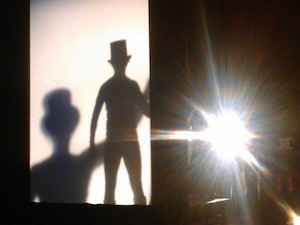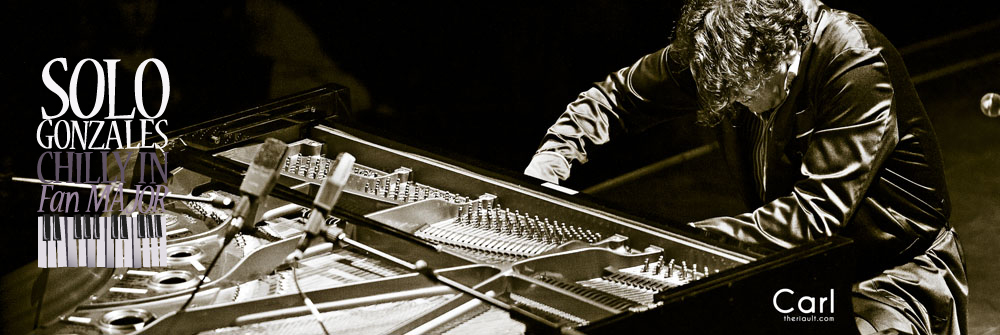 On May 23rd, at the Royal Conservatory of Music’s 21C Music Festival in Toronto, Gonzales, accompanied by the Madawaska Quartet & Ensemble, premiered his “Suite from The Shadow”, which was called “dynamic and invigorating” by NOW Magazine. As Gonzales explained to a CBC interviewer, the longer work is based on Hans Christian Andersen’s adult fairy tale “The Shadow”, which Gonzales was intrigued by:
On May 23rd, at the Royal Conservatory of Music’s 21C Music Festival in Toronto, Gonzales, accompanied by the Madawaska Quartet & Ensemble, premiered his “Suite from The Shadow”, which was called “dynamic and invigorating” by NOW Magazine. As Gonzales explained to a CBC interviewer, the longer work is based on Hans Christian Andersen’s adult fairy tale “The Shadow”, which Gonzales was intrigued by:
I was attracted by its nuanced handling of the age-old duality theme. The tale gets beyond the Faustian bargain into themes of charisma, charlatanism and the unleashed id.
The suite will likely represent the overture in a larger work that is in-progress – as tweeted by @schauspielkoeln:
Heute, Probenbeginn THE SHADOW! http://t.co/OHzbTPDSot @chillygonzales @HerrvonEden @adam_traynor @melkretschmann pic.twitter.com/Jf1n8ECX7V
— schauspielkoeln (@schauspielkoeln) May 12, 2014
Given Gonzales’ renewed interest in orchestral composition, “The Shadow” is sure to be a fascinating and wondrous musical interpretation of Hans Christian Andersen’s story. Gonzales also spoke with Toronto’s Jazz FM about the origin of the suite, and his musical interpretation of the heavy, but humorous themes:
Jazz FM: Let’s talk about “Suite from the Shadow” – the Royal Conservatory came and asked you to put this piece together. When they came to you, was that when you began it, or is this something you had on the back-burner that you were waiting for an opportunity to bring to life?
Gonzales: A little bit like that. You know most I know who are creative have some sense of this “back-burner” way – you can’t really wait for inspiration to strike and so you make a lot of music all the time, and often, it takes years before you realize what something you wrote can be used for, but I’ve been thinking about for this fairy tale for adults called “The Shadow” by Hans Christian Andersen for a few years now, and being very attracted to the idea of the duality of a man whose shadow escapes and leaves him, then comes back a few year later and dominates him.
Jazz FM: Its quite dark, actually.
Gonzales: It’s quite dark, but also quite funny, and if you’ve ever sat on a balcony in the afternoon sun and seen your own shadow on someone’s balcony, you understand probably how Hans Christian Andersen got this idea in the first place. So I’ve been bandying about a bunch of different themes and techniques and genres that I thought would work with certain scenes – there’s a waltz in there because there’s a ballroom scene in which the shadow and his owner are competing for the affections of a princess, and so there’s a kind of a waltz, kind of ménage-a-trois waltz, so to speak. So different genres like that, that I could identify and put them together into this suite, which will premiere on Friday night.
Jazz FM: As someone who has never heard it realized before, is there a certain level of excitement of that night – not only to perform it for people, but to hear it realized?
Gonzales: Sure, it’s new for me to be on a multi-artist bill like this as a composer, more than as the architect of my own planet where people come into it when I perform my own concert. It’s a two-hour affair and this will be something very different for me. I’m grateful for the chance to be thought of in this way. Sometimes my crazy name and my larger than life personality might preclude some people to think that I have quite a serious musical side. Those who know me well I think understand that those are two sides of the same coin. So this evening was reassuring to me that despite all of that, people can hear in what I’m doing, that potential.
Jazz FM: That duality coming back in some way.
Exactly. Well, Chilly Gonzales is absolutely my shadow. He’s someone I created to go into other people’s balconies in a very loose metaphorical way. He enables me to exist in the world – absolutely. You know, I don’t want to get into some 3rd person “Puff Daddy”-type stuff, but there is a reason that people create false identities for themselves.
In the story, a man notices his shadow on a balcony opposite from his, and imagines his shadow having a life of its own. When the man wakes up, he finds that his shadow has actually disappeared, and eventually returns having learned about life by observing people.
This isn’t the first time Gonzales has explored the idea of a part of someone leading a separate life. When he was 17, Gonzales and his brother wrote a musical based on Nikolai Gogol’s short story, “The Nose” (which, incidentally, was written in 1835-36 – a few years before Andersen’s tale). In the original story, a low-level civil servant wakes up one morning only to discover that his nose has run off and is leading a separate life. What’s worse, his nose is competing with him for promotions and status. Gonzales updated his version to be set in the 1980s, where the original civil servant is replaced by a corporate executive whose nose takes his job and steals his girlfriend. The message of the musical is also updated to become a commentary for materialism and corporate immortality.
“The Shadow”, and “The Nose” have elements of what Gonzales alluded to in the interview, namely the creation of alternate identities from within ourselves, which appears to have peaked the curiosity of Gonzales at an early age. What Gogol and Andersen’s stories illustrate is that there are potentially many people within all of us, and that given the chance, parts of our personality (generally connected with the id) could be unleashed and flourish – come out from under a shadow (so to speak). In Gogol’s story, the runaway nose is eventually returned to its rightful owner, but in Andersen’s tale, the owner is killed by his now-living shadow.
Gonzales’ last comment, “there is a reason that people create false identities for themselves” alludes to the idea that in order for people to escape their “boring parts”, they establish an alternate persona that can do what the person themselves wouldn’t dream of doing. Gonzales isn’t “hiding” behind an alternate identity – he’s quick to explain the advantages associated with assuming another persona, and his published music is usually listed as Jason “Chilly Gonzales” Beck, with his alternate identity bookended by his birth name, as if to reaffirm that Gonzales is still the “shadow”. The Gonzales persona has changed over time – from hip-hop prankster, to solo piano composer, to actor and rapper, and now to orchestral suite composer. Gonzales appears to have been created to explore new territory and push the boundaries of entertainment. Instead of conflicting with his “owner’s” ideals, Gonzales has used that wealth of experience to grow beyond what he may have originally been capable of without a persona’s unique abilities.
During the interview, the Gonzales persona is explained as, “someone I created to go into other people’s balconies in a very loose metaphorical way.” The metaphor of Gonzales going onto other people’s balconies is striking. Through his persona, Gonzales has amassed a wealth of experience by being able to enter other people’s “balconies” to observe and learn, and through his music, Gonzales is invited into our lives where his compositions enter our “balconies” of consciousness and reveal something about ourselves. As Andersen’s shadow explained to his master in the original story, “I ran here and there, looked through the highest windows into the rooms…I looked in, and saw what nobody else could see….what no human being has the power of knowing”. With unique experience and genius, Gonzales’ music is able to ‘see’ what no human being can see – the very core of our thoughts, feelings, and emotions.
